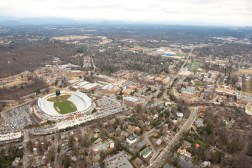Panel: IoT in 2016 is a toy only rich cities can afford

The Internet of Things needs to get cheaper before it can permeate local government, a panel of smart-city experts said Thursday.
Only cities with multimillion-dollar technology budgets can access smart city technology today, said Sokwoo Rhee, associate director of cyber-physical systems at the National Institute of Standards and Technology and director of the agency’s Global City Teams Challenge.
“There are 19,000 cities, towns and communities in the United States,” Rhee said at the panel on sustainability, smart cities, and the Internet of Things, at the Brookings Institute in Washington, D.C. “Only a small percentage can afford to spend the millions and millions of dollars.”
Now, with 5G networking on the horizon — the next generation of wireless technology that promises faster speeds — the importance of overcoming those barriers to entry for cities is essential, Rhee said.
“We have to reduce the barrier of entry to spread this technology and to get this technology to spread to small towns and rural areas,” Rhee said. “To do that, we need to create economies of scale.”
In creating those economies of scale, cities should look to collaboration, Rhee said. But collaboration doesn’t necessarily mean coming up with a set of standards — something his own agency is working on, and cities like New York have moved toward — but rather finding common problems that the private sector can help solve with new products and services.
“It’s kind of cliché. Everyone talks about collaboration, but the type of collaboration I’m talking about has a very specific set of goals,” Rhee said. “We all have to come up with an agreed upon blueprint for transportation and public safety that can be replicable and applicable.”
John Garrity, a senior connectivity adviser for the U.S. Agency for International Development, agreed, and said the public, private and academic sectors needs to get involved in the conversation about how to make the Internet of Things more accessible.
“We’re really focused on alleviating extreme poverty. Connected sensors really help to improve project management and service delivery because of real-time data,” Garrity said. “The more we can drive the ecosystem forward, the more partners that we can get involved with creating the processes and standards … the better.”






